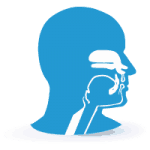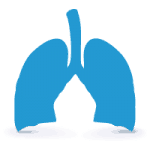
Neurologist
Commonly the head of multi-disciplinary Duchenne healthcare teams.
When to contact a Duchenne trained neurologist?
- If you or your primary physician suspect Duchenne
- When you need a specialist to test for Duchenne
- To lead your multiple provider care
- Initiate genetic testing

Endocrinologist
The endocrine system is affected by chronic glucocorticosteroid use.
When to contact a Duchenne trained endocrinologist?
- When considering initiating or stopping use of steroids
- To regularly assess weight and height
- If weight gain has been difficult to control
- If onset of puberty is delayed
- To get input on bone health status and options

Cardiologist
The heart is a muscle too and can be affected at different rates for those with Duchenne. A cardiologist is essential to a good Duchenne healthcare team.
When to contact a Duchenne trained cardiologist?
- To get a baseline cardiac exam at 6 years old
- To follow up on cardiac measures as recommended by the care guidelines or as needed
- When experiencing chest pain or palpitations
- If there is more fatigue than normal and having trouble doing normal daily routine
- When not sleeping well
- If there is persistent weight loss or vomiting

Psychologist
Some with Duchenne experience language delay and difficulty with focus/attention. Those with Duchenne and their families often require mental health support.
When to contact a Duchenne trained psychologist?
- To assess any delay in language development
- When school-aged and having learning difficulty
- If interaction with others, including peers is difficult
- If there are unusual fears, anxiety or depression
- To help the whole family with the effect of this diagnosis

Orthopedist
Joint contractures and poor bone mineral density are common in Duchenne. An orthopedic doctor specializes in bone and joint health.
When to contact a Duchenne trained orthopedist?
- To get baseline spine x-rays while still ambulatory
- If there is chronic use of steroids which affects bone mineral density (osteoporosis screening)
- To assess if vitamin or supplement regimen is benefiting bone health
- If there is a recent fall and pain or a suspected fracture
- When joint contractures have progressed despite physical therapy interventions
- To consult regarding orthopedic surgical options for ankles and spine

Gastroenterologist (GI)
Muscles associated with chewing and swallowing and nutritional status are affected by Duchenne at varying degrees depending on progression.
When to contact a Duchenne trained gastroenterologist?
- At baseline for assessment and recommendations on nutrition
- Oral intake has decreased and too few calories are being ingested
- Weight is hard to maintain (either too high or too low)
- Swallowing is difficult and/or aspiration in to the lungs has occurred
- Constipation is difficult to manage
- To treat gastroesophageal reflux disorder (GERD)

Pulmonologist
The muscles required for breathing are affected in Duchenne as well. A pulmonologist is able to assess and treat respiratory issues as they change throughout the lifespan. Many of the symptoms might overlap with a recommended cardiology appointment.
When to contact a Duchenne trained pulmonologist?
- To get baseline measures by 6 years of age and to formulate a proactive approach to treatment
- If there is shortness of breath
- If there is difficulty clearing secretions and phlegm and coughing is unproductive
- If you suspect poor respirations at night and need to do a sleep study
- If sleep is interrupted multiple times during the night
- There is more fatigue and more sleepy than normal
- There are frequent headaches during the day
- When it is difficult to pay attention and focus during the day
